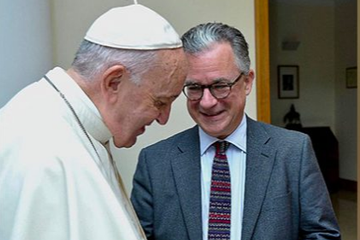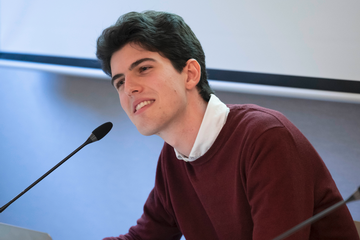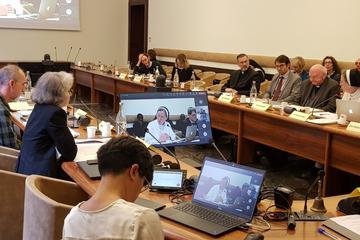
By Laura Ieraci
CHICAGO — One of the most beloved modern saints is also among the most selectively quoted by advocates for change in the Catholic Church, said Father Ian Ker, a world-renowned scholar of St. John Henry Newman.
Father Ker, who is to give a lecture at The Lay Centre Dec. 6, was in Chicago last month, where he gave two presentations on Cardinal Newman, who was canonized by Pope Francis Oct. 13. Father Ker is a senior research fellow at Blackfriars Hall at the University of Oxford, and the author and editor of more than 20 books on the British cardinal.
In his first presentation, Oct. 30, Father Ker shared the stage with Chicagoan and mother of seven Melissa Villalobos, whose miraculous healing from a debilitating health condition in 2013 was attributed to the intercession of Cardinal Newman. Her healing opened the way for Cardinal Newman’s canonization. The evening, titled “John Henry Newman’s Path to Sainthood,” was moderated by Newsweek’s former religion editor Kenneth L. Woodward and held at Holy Name Cathedral Auditorium.
Father Ker’s second presentation, titled “Newman’s Apologetics of the Imagination,” was a public lecture at the University of Chicago Oct. 31. Both events were organized by The Lumen Christi Institute.
In a sit-down interview with The Lay Centre, Father Ker said Newman is often quoted out of context by people who wish to promote an agenda for change in the Church that includes rupture from tradition, but this selective citing of the new saint contradicts the spirit of Newman’s writings. Such people never quote the sentences that come before or after their selected quote, which, if included, would clearly communicate Newman’s belief that the “Church or Christianity has to change in order to remain the same,” Father Ker said.
“This is exactly the point that Benedict XVI made — I don’t know if he had Newman in mind when he said that — change in continuity,” said Father Ker. “He said that in that famous address he made to the Roman Curia in 2005 at Christmastime, and he said the Church changes in order to remain the same: the hermeneutic of continuity as opposed to rupture.”
“As (Cardinal) Avery Dulles pointed out, you can quote Newman very selectively and come up with a very one-sided (view on things),” he continued.
Father Ker said Cardinal Newman would have been among the “reformers” of the Second Vatican Council had he been living at that time.
“But he would have been with the moderate reformers” and “would have never gone along with the reformers who advocated for rupture,” he said.
The septuagenarian scholar described Newman as “a conservative or traditional radical, that is to say that he had lots of new ideas, but they had to be in continuity about the development of doctrine, of course. Doctrine develops not to be different, but to be the same.”
He underlined the practicality of Newman’s seven tests or notes of doctrinal development, on which he elaborates in his most recent book, “Newman on Vatican II.”
“All Newman scholars that I know of think that Newman’s seven tests of doctrinal development are of no practical use,” he said. “But I show in the book they are very illuminating about the (Church’s) declaration on religious freedom.”
Father Ker also underlined the need to understand Newman’s famous essay, “On Consulting the Faithful on Matters of Doctrine,” in its proper context.
“Very often, it’s been called, ‘On Consulting the Laity,’ but it isn’t on consulting the laity,” he said. “People haven’t looked at that essay closely enough. It is taken for granted that it’s all about the laity, but it’s not if you read the thing properly.”
Father Ker said he also didn’t think Newman “would like the idea” of the term “laity” in the Church.
The term, he said, “suggests that baptized Christians, in want of holy orders, are somehow amateur Christians. It suggests you’re not properly fully Christian, which is ridiculous.”
Newman gives examples in the essay of how “the faithful upheld the true doctrine at the time of the Arian heresy,” said Father Ker. “His point is that the bishops to a large extent failed, but the true doctrine was upheld by lay people, priests, holy virgins, monks.”
The documents of the Second Vatican Council define the people of God “in terms of the sacraments” Father Ker continued. “So, everyone has to have baptism,” and it is among the baptized that people are called to different vocations.
Father Ker also clarified that Newman’s use of the term “faithful” did not refer indiscriminately to all of the baptized either. Many people are baptized Catholic, “but they’re not faithful. They’re not full of faith at all. They just happen to be baptized,” he said. By “faithful,” Newman intended those baptized people, in all vocations and states of life, who are “full of faith,” he said.
Reflecting on the two miracles attributed to Newman’s intercession, Father Ker said the saintly cardinal was “very keen” on miracles. “He believed very powerfully in the communion of the saints and intercession,” he said.
Despite the dissent, liberalism, and loss of a “sense of the Magisterium and tradition” among some people, Father Ker said, theology is currently in a healthier state than it was in Newman’s day, when it was characterized by a “very rigid scholasticism.”
On Newman and the human imagination, Father Ker said the new saint valued the importance of human imagination as regards religious experience but also considered it to be “a very dangerous thing because he thought most religious doubts are not intellectual but imaginative.”
He explained: “You know, you wake up and wonder, ‘How could God possibly listen to my prayers? How could he listen to millions and millions of people?’ And, of course, this is imaginative because, intellectually, God is God; he’s not like anybody else."
Unfortuantely, the lecture by Father Ian Ker was cancelled at the last minute due to illness.
(Photo: Laura Ieraci)


